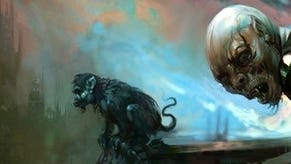Vampire: The Masquerade - Bloodlines
Stop the press. Review in just in time to meet its Undeadline.
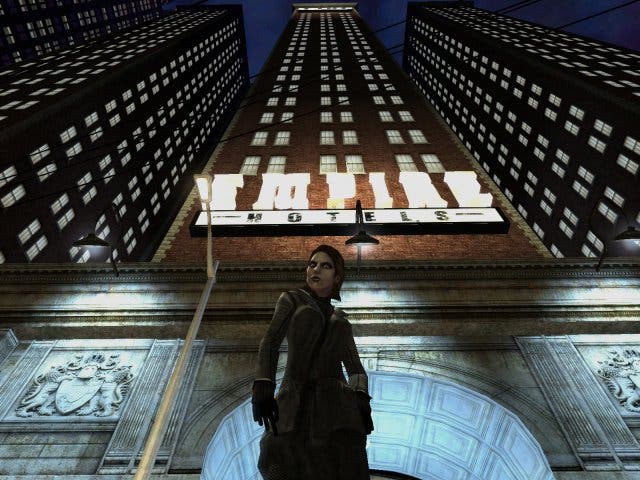
I haven't seen the sun for an eternity.
Okay, a week, but all human eternities are subjective. And I caught a glimpse of it on Thursday when I took a break to go play the ever-popular Be Nice To The Girlfriend To Avoid Her Dumping Me game. But otherwise, the sun has been steadfastly avoided, as every day I played Troika's latest until gone five in the morning, entered a torpor until the early afternoon, only to raise and find - thanks to the encroaching British Winter - the Sun has already disappeared. It's bad. I've taken to injecting vitamin D to prevent my organs prolapsing out of my body in greasy coils in protest.
There was one glorious moment when my flatmate, sharing my Vampiric gaming lifestyle, left the house at sundown for a walk. A memorable journey. Rain was a polluted baptism on our pallid faces. I felt dirty, debased and distant from the milling hordes as any point since the height of teenage alienation, sharing jokes with my friend who'd lived in a world these sheep could never grasp. They may have well been a different species. In other words, Vampire had done what only my very favourite games manage - to get beneath my skin, slide under the membranes of the brain and remix reality for a while. In the same way Thief had me dancing around the streetlights, Vampire had me revelling in my damned difference. That's some trick.
Taken out of context, you'll probably take that as a recommendation. And, I suppose, it is.
There are reservations. The devil's in the details.
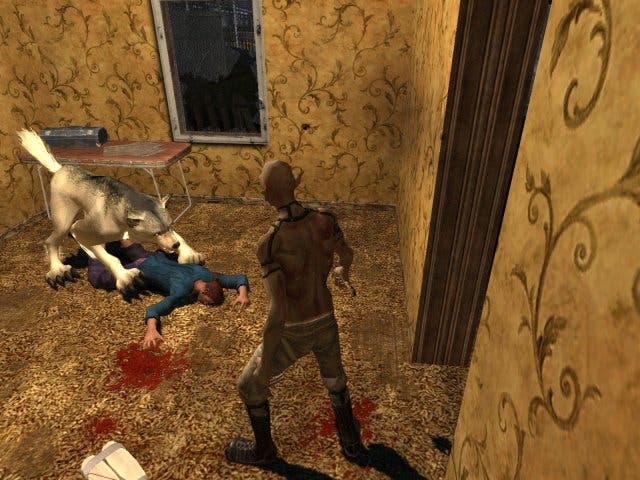
With a game like Vampire, it's probably best to avoid the "Is it an RPG?/Is it an Action game?" argument. Instead, let's put it in the category of the "Immersive Sim" - a little bit of Ion Storm-created jargon that's as good a label as any. File this alongside games like the Deus Exs and System Shocks which mix, to varying degrees, the genres to create something that's really neither one nor the other. Judged by either of their standards, it falls a little short. For those expecting something matching Half-Life 2 because of its Valve-created Source Engine base, Vampire's combat will appear underdeveloped and lumpen. For those used to Troika's previous games like Arcanum or - in the terms of origins - Fallout, will be disappointed in the relatively limited scale. But the magic is how these things combine to do something that neither could do alone, and artificially dividing them loses the magic.
In terms of structure, the game places you as a newly embraced Vampire on the streets of Santa Monica. This is the first of the four hub levels which provide the backbone of the game, much like those you'd find in Knights of the Old Republic or (probably a better comparison) Invisible War. That is, the hubs are living environments full of people who'll respond to your actions or offences. Since the invoking of Invisible War is sure to raise a few hackles, an obvious aside: if you're one of the many who found Invisible War a letdown, Bloodlines is very much what you were hoping for. From its PC-centric design to the grand array of statistics to improve, it'll make you very happy indeed. Equally, with the modern day environment, the simplest way to describe Vampire, especially in the first twenty or so hours of play, is Deus Ex With Vampires.
Simplest, but not the real story. The Devil and The Details, remember.
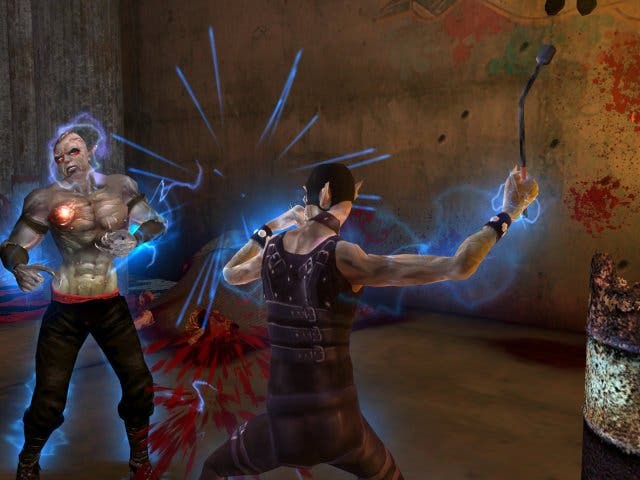
Its most noticeable Deus-Exism is a shared belief in allowing multiple solutions to problems, based on your characters' abilities and your chosen approach. While not quite as variable, you'll find it possible to wander between the two poles of current action gaming - that is action and stealth - as well as a selection of others. Hacking (through a cute typing interface) and lockpicking are obvious, but Vampire stresses direct communication more than most games, up to the point of having separate skills for persuasion, intimidation, seduction and haggle. With a high rating in each, conversation options open up for the player to use. For example, I found myself gleefully playing a femme fatale for the majority of the game, which was immensely rewarding. Personalising any game in ways like this is powerful - when presented with a building full of enemies and a boss to assassinate, some will find kicking down the door and offing everyone amusing, others will prefer playing the ninja, and yet more will opt for talking past the doorman and then flirting with the leader enough to send away their guards. Also, like Planescape Torment, conversation options will alter depending upon your statistics and even your clan. For example, if you play the insane Malkavians all your character's options are altered to enigmatic pseudo-prophetic schizo-tongued gibberish (As a hypothetical example, while a more sober clan may say "I'm looking for a firearm," a Malkavian would mumble out "Cordite sticks and iron-fire I seek for the bang-bangs." Er... except competently written, y'know.)
Which brings us neatly to the Clans. That is, for those who require a trad-fantasy reference, character classes. Seven of these vampire Bloodlines are available, each with their own selection of supernatural skills, attitudes and details. Earlier I referenced that violence and stealth are options. Well, there's violence and there's violence. The question is, what manner of violence are you looking for? Whether you specialise in firearms (relatively weedy until skills are increased) or close-combat (generally the better idea), is only the base of it. On a fundamental level, playing a Brujah capable of physically boosting himself manifold into a super-fast super-strong killing machine differs hugely from playing a blood-mage of the Tremere, who utilise sorcery capable of doing antisocial things like making opponent's blood boil.
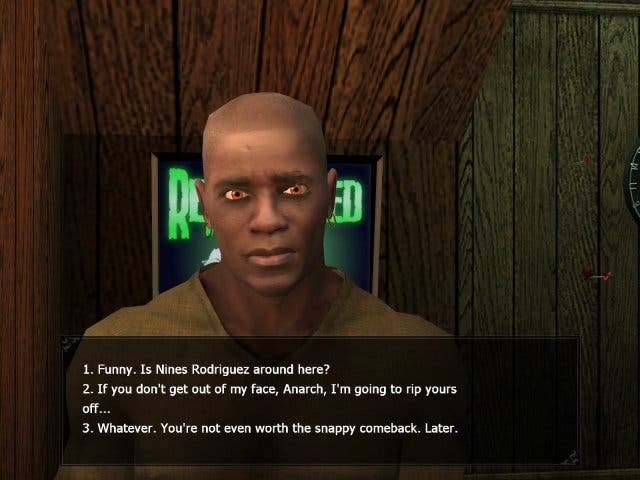
Even better, Vampire makes playing a Clan far more than just a different selection of supernatural powers. Every clan has a reputation, garnering specific reactions from certain NPCs depending on their prejudices. The most extreme example of this is the Nosferatu, stealth-specialists with physically monstrous forms who spend most of their time running around the sewers beneath the city to avoid prompting screaming locals and police-hunts. Bloodlines does its very best to immerse you in a unique social universe.
It crosses over to the game mechanics too. Most central is blood, which basically acts like mana in a fantasy game. With a major difference: the average D&D mage doesn't have to suck all the life out of a passing kobold to power up again. Where to get blood is a constant dilemma, which different characters find solutions for. Sure, you can subsist off rats, but it's a little undignified. Regular trips to the bloodbank prove expensive. For a better feed, you'll be wanting humans. Problem is, people tend to object to monsters jumping them in the middle of the street and do terribly impolite things like calling the police. Dark alleyways or - even better - seducing some poor unfortunate are better solutions, and if someone's stupid enough to try and fight you... well, you might as well have a nibble. They were asking for it.
There's another couple of good reasons to worry about feeding. Firstly, if you lap at the jugular too long, you could kill them. Do this to an innocent, and you'll lose humanity points. Lose a lot, and you'll start having your conversation options become more bestial, like a quota-missing telephone salesperson. Lose them all and you'll fall into a beast state, and lose the game. Also, the lower your humanity, the more likely you'll enter a frenzy when your blood levels dip, where you lose all control and go on a killing spree. The second reason is a little thing called the Masquerade, the set of Vampire laws created to avoid humans tooling up with napalm and going looking for trouble. That is "Don't let them know we exist". Do anything that breaks the code - for example, using your more dramatic powers in public - and you'll lose Masquerade points. Lose them all and... well, cue vampire hunters and an inevitable game-over.
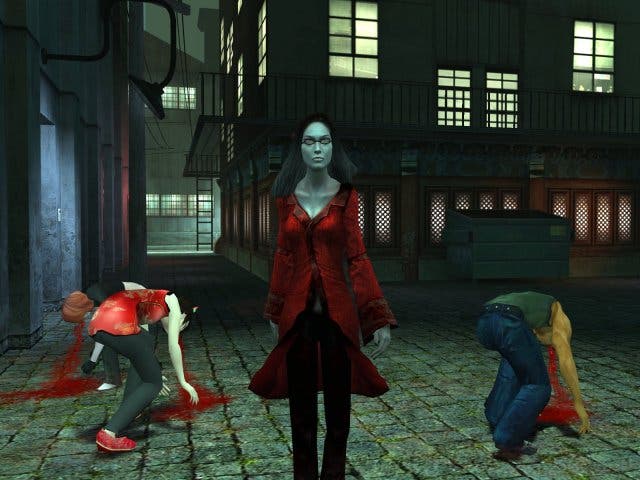
While it's the game mechanics which create the meat of this vampiric world, for what counts as its soul - and it's a dark soul indeed - you've got to look elsewhere. Specifically at the prime pillar of the role-playing game: the narrative.
Bloodlines has the best script I've seen in a videogame since... well, since ever. In recent times, Planescape is probably hits the same peaks that Bloodlines does, and has the advantage of mass of words, but in terms of writing a modern, adult videogame, no-one's come near. No-one's even tried.
It makes cultural references with the casualness of someone who actually knows what they're talking about - there's a particularly memorable off-hand gag about fetish slang which dazzled me with the skill, audacity and comfort it showed. Where most games that try something similar come across as callow posturing, this was done as if it were the most natural thing in the world. It deals with the big adult topics - sex, death, whatever - in truthful and honest ways. It has characters who swear as much as anyone out of Kingpin - but they're characters who swear rather than an attempt to turn the game into a noir thriller by lobbing a few four-letter words into the mix. Conversely, there are characters who have perfectly civil aspects. Troika has done the writerly thing - that is attempt to write people rather than ciphers. I can only applaud.
Take the most obviously eyebrow-raising character, Jeanette (The goth-schoolgirl whose top strains with obvious implants). While on the box you may take her as mere wrist-fodder for the strained-testicle-possessing members of the audience, she's not treated as such. When she speaks, she's a babble of egocentric nonsense - predictable, as she's a Malkavian. However, it's carefully judged egocentric nonsense. She's essentially a goth LiveJournal with legs, and, in her extreme way, credible. Even the fact she has a ludicrous cleavage ties in tightly to the plot. Rather than many games where every woman thrusts D-cups and upwards in your direction, Vampire chooses. In Santa Monica at least, no-one has a cleavage like Jeanette. Why is she like that? To Troika's eternal credit, it provides a reason. And if you ever wander into something that plays to what's cheerfully described as "fan-service", it's because you've gone out hunting after it yourself.
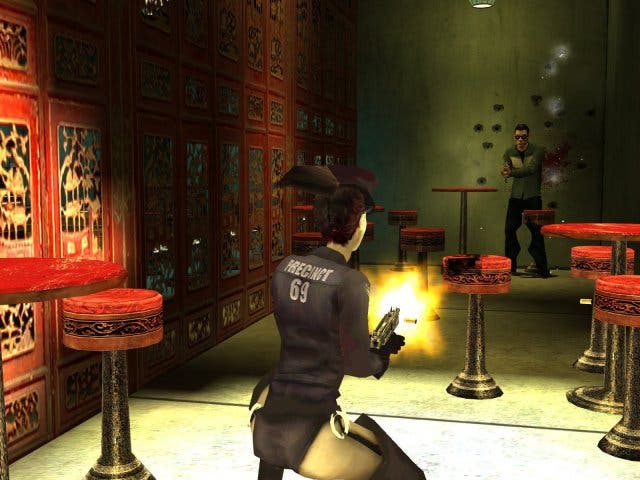
It's also got another trump card. While the Source facial animation technology adds quality to Half-Life 2, it's given a far more strenuous and more seriously emotive workout here. Characters act and cavort directly at you with an impressive simulacra of life, including specific body language. I'm one of the people who turn on the subtitles and skip most voice acting, but was happily mesmerised by these digital actors and their lives throughout. The presentation amplifies Bloodline's positive traits: this is technology in service of greater emotional impact, and as laudable thing as I can imagine.
So, an amazing, memorable, groundbreaking game. Well worth the 7/10 that it's received.
Devils. Details.
The Details are more general flaws. Minor elements prove mostly forgivable - there's a lot of loading between sub-areas, for example. The combat, as noted above, isn't that great - but that didn't stop Deus Ex being one of the greatest games ever, so also forgivable. What's more frustrating is that the further you progress into the game, the more you wander from what made the opening so intoxicating. Missions take you off the hub areas, into increasingly long trips into mostly linear dungeons.
Its decline is a slow one - things are going awry by the point of the Hollywood sewers - and you find yourself playing on, desperation growing as you hope it rallies. Sadly, by the final sections of the game, you find yourself fighting respawning katana-wielding mobs, boss-fights with enormous energy bars and simple Tomb Raider-style puzzles. If you spent the majority of your experience on making a talking character, for example, you'd be disappointed to find the last six or so hours lacking a chance to slut your way to victory. No significant multi-routing remains either.
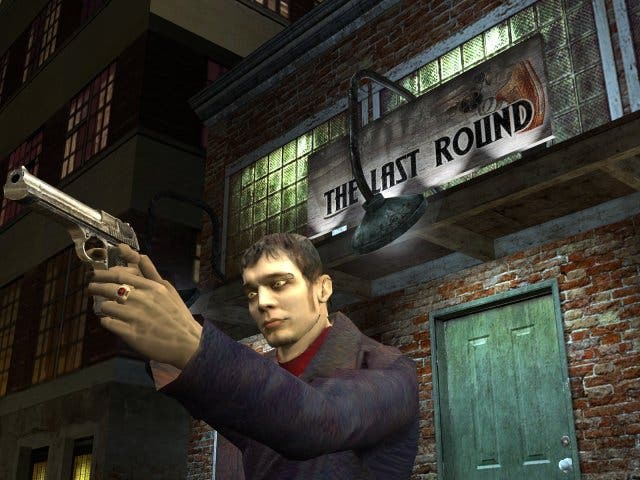
This also derails the plot. While still as well written as always, the reduction to a simple action game climaxing in a short cut-scene with a few interactive options leaves anyone following it for the narrative feeling cheated. The ending is set up expertly, but the pay-off simply a kick in the guts after a final run in the game that's like having your canines pulled.
These Details take Bloodlines down to a solid 8. The concluding run doesn't take away the greatness of the majority of the game, just makes it one to be filed next to the Xen levels of Half-Life in the "What were they thinking?" stakes. In fact, in some ways it's a shame even to mention it - knowing that there's relatively little payoff for some of the earlier material reduces the joy of that initial flush.
Now, the Devils.
Easy to sum up: Game isn't finished.
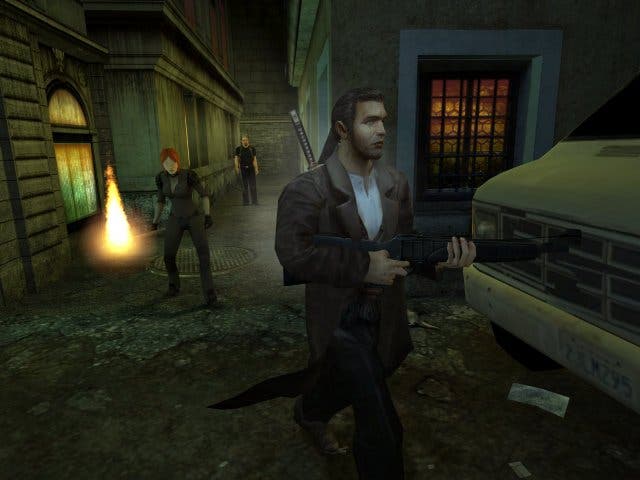
At the opening, you forgive the array of bugs and glitches as it being "rough around the edges", so joining the long line of games which stressed imagination above mere competence and polish: Sure, characters glide out of the room in the intro sequence... who cares? Look how amazing Santa Monica is...
Problem is, as you progress, they escalate. By the time you've reached the climax, they're become impossible to ignore and made all the worse by you not even particularly enjoying the game anymore. Having animation flickers and textures going wrong is a different thing from - say - reloading and finding that simple action has broken some of the level's scripting or getting caught in a game-ending crash bug upon exiting a mandatory mission. It runs considerably worse than Half-Life, sharing the stutter-frame-rate problem of its mother engine, but generally worse. It eats up Virtual Memory like anything, with long sessions leading to increasingly lengthy load times and slower frame-rates (I'm not a programmer, but "Memory Leak" sounds like a likely explanation). It just crashes. Even surface level shows signs of being rushed to release amass, like the dialogue in Chinatown having so many typos that even I, with my rudimentary grasp of the English tongue, wince.
While a determined player - especially a PC RPG player - will forgive much of this, and my selection of bugs are fairly extreme examples of what's going wrong, it's really not on. Suffice to say, those stories about it being done ages ago and being stuck on a shelf until Half-Life 2 was finished are evidently a lie. Someone decided to throw this into the shops and then patch later.
I don't know about hunting Vampires, but someone should start hunting accountants.







